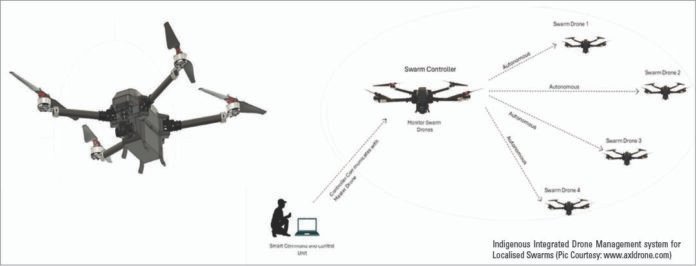I ndia’s pursuit of Aatmanirbharta (self-reliance) in defence has reached a transformative phase, with startups and MSMEs playing a crucial role in driving innovation, developing indigenous technologies, and boosting defence production. Long reliant on foreign-origin products, India is breaking this dependency through initiatives like Startup India and Aatmanirbhar Bharat, fostering a culture of self-reliance and innovation. Traditionally dominated by large enterprises, the defence sector is witnessing a paradigm shift, as smaller players reshape the ecosystem by advancing critical technologies.
The modern startup ecosystem gained momentum in the 2000s, though Infosys (founded in 1981) is often regarded as an early pioneer. India’s first unicorn, InMobi, achieved a $1 billion valuation in 2011, while ideaForge (established in 2007) emerged as the country’s first defence-focused startup, specialising in unmanned aerial vehicles (UAVs). By December 2023, India’s defence sector included approximately 16,000 MSMEs, reflecting significant growth driven by self-reliance and indigenisation efforts. Defence exports, which grew from Rs 686 crore in FY 2013-14 to Rs 21,083 crore in FY 2023-24 (marking an increase of over 30 times in the past decade), underline the critical role of startups and MSMEs in strengthening India’s defence capabilities and driving economic progress.
Role of Startups in Defence Innovation
Startups are transforming India’s defence sector by fostering innovation, enhancing self-reliance, and addressing critical challenges with agility. They are advancing technologies in unmanned aerial systems (UAS), artificial intelligence (AI), robotics, precision manufacturing, IoT, and satellites, creating solutions tailored for the armed forces. Contributions such as high-altitude surveillance drones, thermal imaging, and AI-powered battlefield management systems have become vital for modern defence operations. Indigenous innovations have reduced import dependency, strengthened supply chains, and driven economic growth through job creation and industrial expansion. Collaborations with academia, private companies, and defence public sector undertakings (DPSUs) are further bolstering the ecosystem. Globally, startups are delivering disruptive, cost-effective solutions that are reshaping modern warfare and becoming decisive war-winning factors.
Startups in India are transforming the defence ecosystem by developing ground-breaking technologies across unmanned systems, robotics, and AI
Policy Framework
The Indian government has created a robust policy framework to support defence startups, fostering innovation and indigenisation through initiatives like the Defence Production and Export Promotion Policy (DPEPP), iDEX, and Make in India. By prioritising domestic procurement and offering financial support through grants, venture capital, and innovation hubs, startups can scale operations and deliver cutting-edge products. Access to advanced testing facilities accelerates development, while collaborations with research institutions, public sector undertakings, and global players enable rapid prototyping. Startups address grassroots challenges with cost-efficient solutions, driving economic growth, skilled employment, and decentralisation, positioning India as a leading player in defence innovation and self-reliance.
With policy frameworks like iDEX and Make in India, the Indian government has provided vital support to startups in the defence sector. Through strategic collaborations and cutting-edge R&D, these companies are pushing the envelope of innovation, securing India’s position as an important player in global defence solutions and exports
Challenges Faced
Despite their significant contributions, startups in the defence sector encounter several challenges that impede their growth and innovation. Securing sufficient funding for research and development remains a critical obstacle, limiting their ability to sustain long-term innovation. Hurdles such as complex procurement processes and regulatory delays often slow down the deployment of new technologies. Additionally, limited access to advanced manufacturing and testing infrastructure poses significant constraints on their growth and scalability. While the Indian defence industry aspires to establish itself as a global defence exporter, navigating international markets presents challenges for startups, further complicating their ability to compete on a global scale.
Sectors Driving Startup Growth in Defence
The defence sector has witnessed unprecedented growth, fuelled by startups innovating across various domains. These enterprises are addressing critical challenges and transforming India’s defence capabilities through indigenous, cost-effective, and technologically advanced solutions. A closer look at key areas highlights the immense contribution of startups in shaping the future of defence:
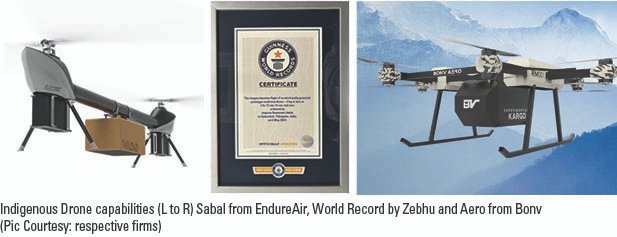
Unmanned Aerial Systems (UAS)/Drones
India’s defence sector has witnessed remarkable advancements driven by the contributions of startups specialising in drone technology. Many firms have secured substantial contracts with the Indian Armed Forces, delivering cutting-edge unmanned systems for surveillance, reconnaissance, logistics, and combat operations. These startups are driving innovation by fostering design-level thinking and developing indigenous solutions. While there are many success stories, newer startups continue to gain prominence in tackling future challenges.
- Axldrone specialises in developing indigenous drones with critical hardware components such as remote controllers, GPS modules, and power distribution boards (PDBs). Their platforms, Aakash and Axl_Viman, facilitate seamless drone management across applications such as surveillance, law enforcement, disaster relief, and agriculture. Axldrone also excels in providing end-to-end customised solutions for swarm drone operations and integrated drone management systems.
- BonV Aero has developed a fully autonomous logistics drone capable of operating in extreme environments, including high-altitude regions like Ladakh. The unveiling of the Air Orca in Bhubaneswar marked a significant milestone in indigenous drone innovation.
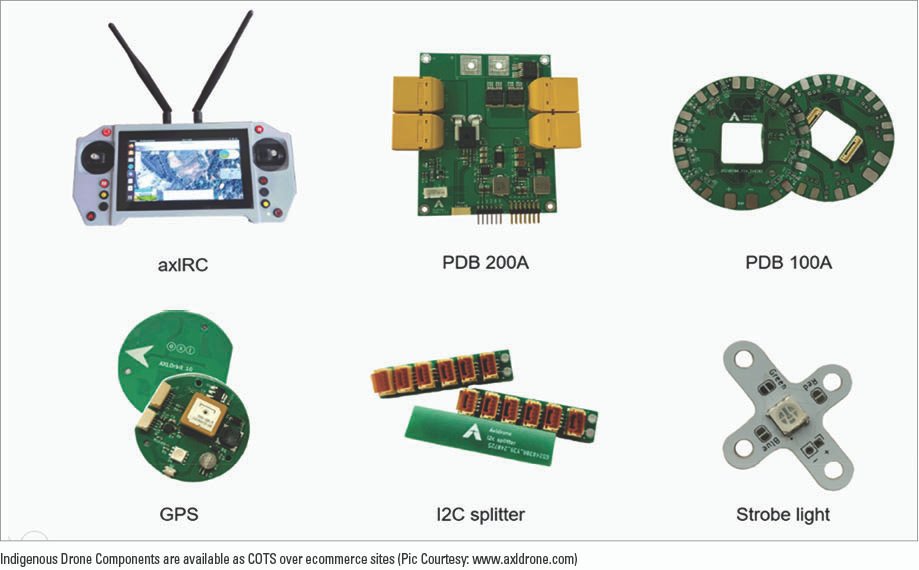
- EndureAir Systems, incubated at IIT Kanpur, focuses on drones with heavy payload capabilities and high endurance. Their Sabal 20 unmanned aerial vehicle, capable of carrying a 20-kilogram payload, has been deployed to support logistics in forward areas along the Eastern Theatre.
- Zebu Intelligent Systems set a Guinness World Record for the longest endurance electric-powered flight by a drone under 5 kg, with a flight time exceeding three hours. This achievement underscores their advanced propulsion technology and commitment to innovation.
With over 150 startups actively working on unmanned systems, India’s indigenous UAVs are saving approximately Rs 1,000 crore annually while contributing to the nation’s growing defence exports. These startups exemplify the growing strength of India’s drone industry, setting new benchmarks in technological efficiency and operational capability while driving the modernisation and self-reliance of the defence forces.
Robotics
Robotics is being adopted as a critical component of modernisation. Startups are developing solutions tailored for diverse applications such as inspection, logistics, security, and surveillance. These systems integrate cutting-edge technologies, including AI, machine vision, IoT hardware, mesh networks, and edge computing, enabling adaptability to dynamic environments, predictive maintenance, and operational scalability.
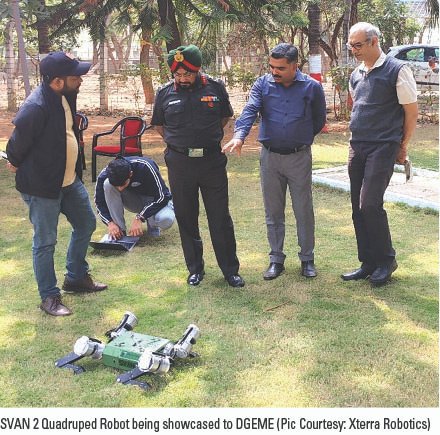
Craic Precision from Bengaluru has been developing innovative IoT-based solutions such as firearm training systems, battlefield simulations, and situational awareness applications, collaborating with forces on projects like urban warfare and landmine training.
xTerra Robotics from IIT Kanpur excels in the development of autonomous quadruped robots like the SVAN M2, equipped with advanced sensors for inspection, security, and surveillance. Compared to a foreign-origin robodog, this homegrown technology is more versatile, with the potential to scale into a Robo Mule capable of carrying larger payloads, thanks to the advancements achieved in software and design dynamics.
Simulation-based training tools are transforming defence preparedness by offering immersive and cost-effective solutions for realistic training, operational planning, and enhanced readiness
Gridbots excels in fully indigenous robotic systems, offering advanced autonomous mobile robots (AMRs) and robotic manipulators for industrial automation and defence applications. Their innovative solutions are designed to meet the complex demands of precision, adaptability, and operational efficiency, making them a key player in the robotics domain at global level.
In contrast, 8oL Robotics focuses on UAV support technologies, including TRL 7 flight controllers for robust data handling.
These companies emphasise indigenous development, reducing dependency on imported technologies while enhancing operational efficiency and adaptability. Their innovations are driving significant advancements in the defence and industrial sectors, ensuring readiness for evolving challenges.
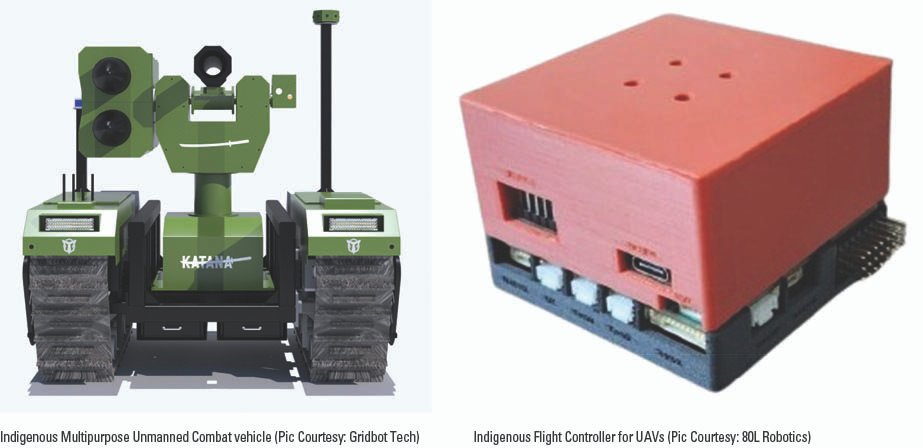
Artificial Intelligence (AI)
In the ongoing global conflicts, we are seeing how AI is driving advancements in surveillance, battlefield management, and predictive analytics. As a cornerstone of modern defence strategies, AI-powered solutions are reshaping the landscape with real-time analytics, predictive insights, and seamless integration with drones and robotics to enhance decision-making and operational efficiency.
To unlock the full potential of startups in achieving Aatma-nirbharta, a strategic and compre-hensive approach is essential. Streamlining defence procurement processes is critical to encouraging startup participation, minimising delays in sales cycle, and fostering innovation
Innovative startups like Zenerative Minds, incubated at IIIT Hyderabad, stand as a beacon of transformation in the defence sector. Known for its flagship product Tathya, a bespoke Generative AI solution for defence, and its notable success in the Samvaad.AI iDEX challenge for the Indian Navy, Zenerative Minds excels in Generative AI and computer vision. The company delivers mission-critical solutions that enhance operational efficiency and innovation in defence applications, driving the sector forward through automation and state-of-the-art technology.
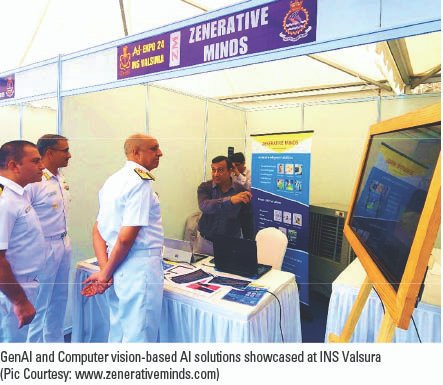
Simulation and Training
Simulation-based training tools are transforming defence preparedness by offering immersive and cost-effective solutions for realistic training, operational planning, and enhanced readiness. Startups such as Kravis Tech are at the forefront of this revolution, utilizing advanced Virtual Reality (VR), Augmented Reality (AR), and Mixed Reality (MR) technologies. These innovations provide detailed 3D terrain modelling and equipment simulations, effectively replicating real-world scenarios. These tools ensure high-quality training for soldiers and Agniveers across all three services, fostering efficiency and operational excellence. In 2023 alone, defence simulation startups contributed Rs 700 crore to various projects, with approximately 20 companies specializing in this field. Kravis Tech stands out for its AR/VR-based simulation solutions, creating meaningful and impactful training environments that align with the evolving needs of modern armed forces.

Electronic Warfare/ Anti Drone System
Startups are advancing communication, radar, and electronic warfare systems for secure and seamless defence applications. Aidin Technologies, based in Bangalore, excels in RF systems, custom power supplies, and electronic warfare. Its SECUDOME Counter-Unmanned Aerial System autonomously detects and neutralises drones with 360-degree detection, long-range jamming, and geo-fencing. With AS9100-Rev D certification and ISRO-certified facilities, Aidin sets a high standard in defence technology innovation.
These sectors collectively highlight the transformative impact of startups on India’s defence landscape. By delivering innovative, indigenous solutions tailored to the unique challenges of the armed forces, startups are not only enhancing operational capabilities but also contributing to India’s self-reliance and global competitiveness in the defence sector.
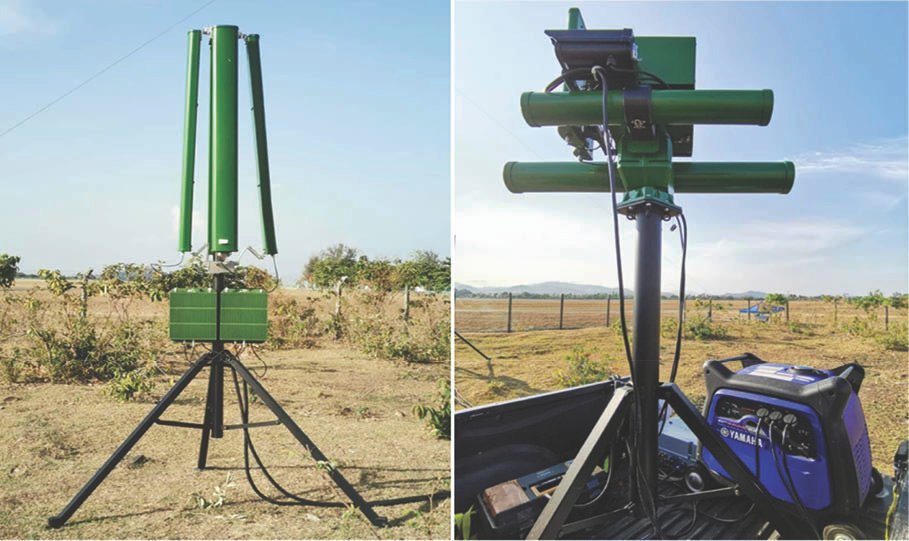
The Path Ahead
To unlock the full potential of startups in achieving Aatmanirbharta, a strategic and comprehensive approach is essential. Streamlining defence procurement processes is critical to encouraging startup participation, minimising delays in sales cycle, and fostering innovation. Enhanced support for research and development (R&D) through increased funding, grants, and targeted incentives will empower startups to develop and scale cutting-edge solutions tailored to India’s defence needs.
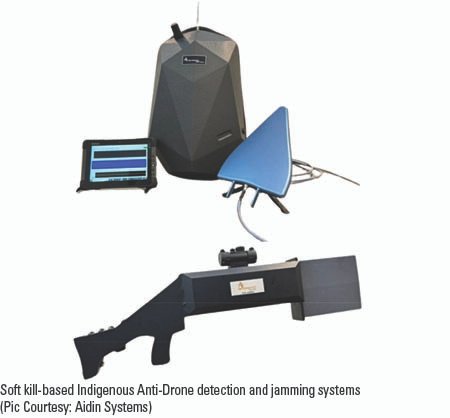
Collaboration plays a vital role in this effort. Strengthening partnerships among startups, MSMEs, DPSUs, academia, and private companies fosters a synergistic ecosystem that drives innovation and collective problem-solving. Startups, adept at addressing grassroots defence challenges, can deliver tailored solutions through iterative R&D and stakeholder support, overcoming limitations of traditional open tenders.
Targeted policies promoting defence exports will enable MSMEs and startups to access global markets, positioning India as a global leader in defence technology. Together, these measures will drive self-reliance and transformative growth in India’s defence sectors.
–The writer is an SME and independent consultant in military technology. The views expressed are of the writer and do not necessarily reflect the views of Raksha Anirveda

